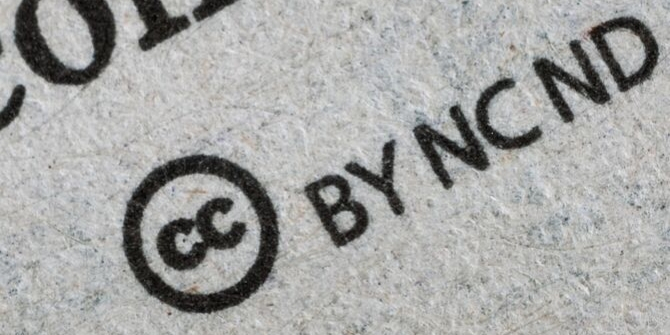The extent that authors retain control over their published research is dependent on what rights they sign over to their publisher prior to publication. As part of efforts to promote the immediate open publication of research a number of research funders have endorsed the Rights Retention Strategy (RRS), by which authors can declare their author-accepted manuscript to be open access. In this post Stephen Eglen, explores the rights retention strategy and discusses the potential impact it might have on scholarly communication more broadly.
In August 2021, UKRI finally announced their long-awaited revised open access policy, and from April 2022 will require authors to make their research articles immediately open access, either via gold or green OA. The green route to open access can be achieved in subscription journals using something termed the Rights Retention Strategy (RRS) that has been developed by cOAlition S, and mandated for example for research articles resulting from work funded by Wellcome. I have written a primer, on what this means for researchers. In essence, authors declare that any author-accepted manuscript (AAM) resulting from their manuscript submitted to a journal for publication can be made freely available without embargo. This provides a pragmatic solution, free of author fees, commonly termed ‘green OA’, as an alternative to the publisher-preferred model of ‘gold OA’ where an article processing charge is often required. UKRI see both green and gold OA as equally valid approaches to sharing work.
As a researcher, I think the RRS is a valuable tool for us to retain rights on our work, rather than handing over all our rights at the manuscript acceptance stage. Several publishers have already responded negatively to this proposal. However, despite their objections, some of these publishers are now publishing manuscripts that have adopted the RRS language.
So, now that the UKRI has joined other funders such as Wellcome in supporting rights retention routes, what next? How might publishers and authors respond?
Desk rejection of manuscripts
Many people are rightly concerned about enforcement of the RRS. What if a journal reviews and accepts my paper, but then asks me to sign a copyright transfer form that e.g. requires me not to share my author-accepted manuscript? To date, most authors simply sign the form to get their paper into press as soon as possible. Authors, rightly will want to avoid protracted copyright discussions that may ultimately cause their paper to be rejected.
In response, I would suggest that journal editors are under no compulsion to accept papers for review that use RRS. If the editor notes that the journal’s copyright requirements will conflict with the RRS, in the first instance I would suggest that journal editors might reconsider the journal’s requirements. All that is needed is a licence to publish from the authors, rather than any transfer of copyright. Failing that, if the journal intends to ignore the RRS, and require copyright transfer at acceptance that could negate the RRS, then instead the editor should desk reject the submission. It will then be up to researchers to decide for themselves in whose interests the journal is acting.
How many papers will be green OA vs gold OA?
The UKRI policy is ambitious in that it allows both green and gold OA solutions for compliance. Publishers may be hoping that most authors will still prefer to take the gold route to open access, so that the ‘version of record’ (VOR) can be freely shared in most cases, rather than the AAM. However, the route to gold is looking increasingly expensive, with few mechanisms to prevent their costs continuing to increase. Even with ‘publish and read’ deals in place, and pledges of UKRI funds to support open access, funds are finite, and so an author cannot assume that funds will always be available. By contrast, no author-facing fees are required for green OA, making it a sensible default route to compliance in hybrid journals.
Will hybrid journals disappear?
Judging by publisher’s reactions, the biggest threat that RRS poses is that it undermines ‘hybrid’ journals that are subscription-based and charge APCs for papers to be made open access. If used at scale to support green OA, hybrid journals will lose APC income. Libraries may begin to unsubscribe from these journals if most of the content is freely available, putting these journals at risk. These journals may therefore decide to return a pure subscription model (desk rejecting papers that wish to use RRS), or flip to a gold APC model. A small number of journals are now exploring the ‘subscribe to open’ model, see below, in tandem with support from libraries.
This does present risks, e.g. if most journals require APCs to publish in, researchers and institutions with limited funds will be excluded from publishing in those venues. Waivers are sometimes available, but are not reliable or widely available. If we wish to make publishing more equitable, we need a more reliable solution than APC waivers (see next). However, on balance, if RRS means that hybrid journals will disappear, I think this is a good solution to the current ‘double dipping’ problem where we are paying both to read and publish in the same journal.
Sustainable alternatives to publishing?
Irrespective of what legacy publishers may choose to do to respond to this latest move, we should be mindful that there are many alternative routes to sharing the results of our research, beyond sharing our manuscript. As research becomes increasingly digital, we are able to share much more of our data and research artefacts (code, protocols, results) generated throughout our research lifecycle. If we view our manuscripts as just one part of our scholarly output, we should be looking towards infrastructure solutions that allow us to share these valuable resources.
The preprint server arXiv just turned 30 years old, and is seen as a valuable service by many in the mathematical and physical sciences. It has inspired similar preprints in many other disciplines. arXiv is supported by grants and institutions (two of the four platinum members are UK universities). As well as hosting preprints, arXiv is now used to host diamond OA ‘overlay’ journals, which I believe provide a much more sustainable way forward for publishing — free to read and publish. Several other approaches worth highlighting briefly include:
- Subscribe to Open using library funding to convert subscription journals to open access.
- The Open Library Of Humanities uses library support to provide open access journals.
- The Journal of Open Source Software relies entirely on free cloud infrastructure (github) to manage and host a journal.
By working internationally to provide reliable scholarly communications infrastructure, we should be able to embrace forward-looking publishers and initiatives that help revolutionize publishing, rather than leaving us beholden at the hands of legacy publishers providing a limited service. The rights retention strategy will hopefully play a small role in this revolution by allowing researchers to retain rights over our work.
Note: This article gives the views of the author, and not the position of the LSE Impact Blog, nor of the London School of Economics. Please review our comments policy if you have any concerns on posting a comment below
Image Credit: Dan Meyers via Unsplash.








